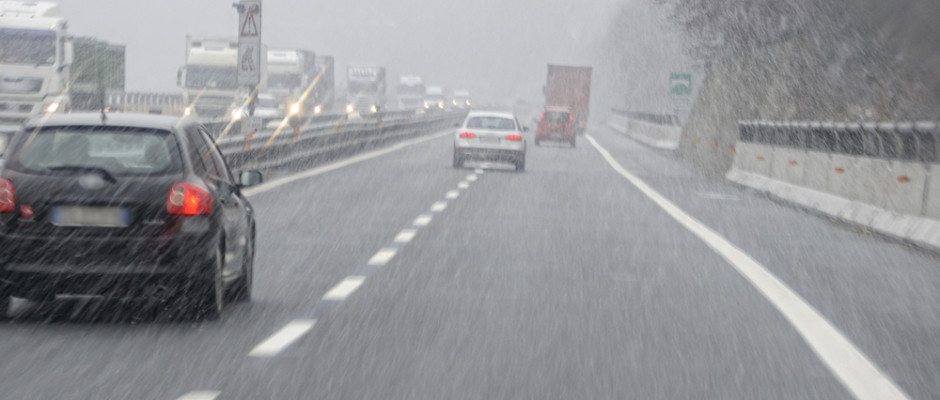Top 2 Major Causes of Non-Driving Car Accidents

Contrary to popular belief, car accidents are not only caused by distracted and negligent drivers. They may also be incurred due to environmental factors and circumstances that are not directly within one's control. While texting and drunk driving are certainly among some of the most preventable causes of car accidents, there are non-driver related causes as well. Self-awareness is the first step in helping reduce the frequency of car accidents. It is important for drivers to be aware of the wide range of situations that can cause accidents, so that they may enhance their own safety as well as the safety of others on the road.
Two Types of Non-Driver Accidents: Road Conditions and Poor Weather
The physical condition of the road plays a significant role in car accidents. If a road is not responsibly maintained, it can be difficult to navigate, maintain traction, or brake in the event of a sudden hazard. The same may be said for weather conditions. Moisture, bright glares, or fog can impair visibility, make the road slippery, and increase the chances of an accident.
1. Car Accidents Caused By Road Conditions: Who Is Liable and Filing a Claim
In the majority of car accidents, it is not difficult to determine who is liable for the damages. For example, if a driver is stopped at a stop sign and is rear-ended, then the driver who ran into them will most likely be held liable for the damage to the vehicle, as well as for any injuries incurred. However, there are some accidents that occur that may not necessarily have to do with careless or reckless driving. These accidents can be due to:
- Potholes
- Oil and chip
- Shoulder drop-offs
- Construction
- Icy, snowy, or wet roads
In these types of situations, the government entity that is in charge of the upkeep of roadways will typically be charged and held responsible for any car accidents that occurred on a poorly maintained road. Such "entities" involve any state, city, or county. The reason such organization can be held responsible is because they are entrusted with repairing roads and keeping them safe. It is part of their job and they can therefore be held liable for damages that result due to incompetence or neglect. State laws will usually allow the government a reasonable amount of time to discover poor road conditions and repair them accordingly. Usually, governments discover dangerous roadways through one of two ways:
- Individuals reporting the dangerous conditions of the roads
- Through regular surveys of the roads
If the government has not discovered the road condition, there is a possibility it will not be held responsible for car accidents. One exception could be that they should have discovered it (especially if the dangerous condition has been around a while), even if they did not actually know about it. The government also may not be responsible for damages if it has not been given enough time to repair the road condition. Ultimately, if a claim against the government is going to be made for car accidents on roadways, two things need to be established:
- The government knew about the dangerous conditions or should have known about it
- The government did not repair the conditions within a reasonable time frame
2. Car Accidents Caused By Inclement Weather
Inclement weather is also a huge factor in car accidents, particularly in areas that experience drastic fluctuations in temperature. Some common weather conditions that could impair safe driving include, but are not limited to, the following:
- Rain
- Sleet
- Hail
- Snow
- Ices
- Sun glare
- Fog
Inclement weather impacts moving vehicles and road conditions in a variety of ways. Air temperature and humidity, for example, influences road treatment strategy and construction planning. Wind speed impacts visibility (blown snow, dust, etc.) and causes lane obstruction (wind-blown snow or ice, debris, etc.). The weather can also have a significant effect on the pavement temperature, thus causing the bad road conditions already detailed above. Pavement temperature additionally causes infrastructure damage and influences road friction, which can effect traffic speed and increase the risk of car accidents. For wetter areas, roads can be influenced by water levels, which will accumulate to the point of significant road submersion and increase the risk of unsafe driving. On average, there are more than 5,000 cars that crash every year, and a little over 20% of those crashes are related to adverse weather conditions. It is also estimated that nearly 6,000 human beings are killed and over 400,000 are injured due to weather-related accidents. Many of these accidents are said to occur during damp conditions, such as wet pavements or rainfall. A smaller percentage of accidents occur during certain winter conditions like icy roads or slushy pavements. About 3% happen in fog. While drivers do not have control over what conditions they drive in during vacation, on the way home, or while going to work, they do have some control over their own actions. It is crucial for all vehicle owners to know of the dangers of inclement weather and to drive with self-awareness, in order to ensure they do not harm themselves or others while on the road. Looking for an Attorney? Car accidents can be traumatizing in a number of ways. Not only are they financially damaging; they are emotionally distressing and can have a long-lasting psychological impact on the victims and their families. If you or someone you love were involved in a car accident and require legal assistance, the personal injury attorneys at Clore Law can help. Call 843-722-8070 to learn more now.
Contact Us
Clore Law Group welcomes your questions about any issues concerning a serious personal injury, car accident, medical malpractice, nursing home neglect, or business tort. If you have a viable claim, we’ll explain the legal process. Since consultations are always free, there’s no cost in learning your legal options.